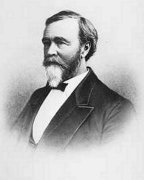
ex-West Point Cadet Gilpin - First Colorado Territorial Governor
By Col (Ret) David Hughes
It was a series of coincidences that precipitated a number of decisions – by both the Confederacy and the Union that firmly started the Civil War in Colorado.
First of all, as the sheer number of gold rushers, opportunists, mixed in with abolitionists and secessionists answering the call of “Pike Peak or Bust” arrived at the base of the Rock Mountains it became clear that a better form of local government was badly needed. When Kansas was admitted as a State to try and keep it in the Union, the land to the west of it reverted to ‘Indian Lands’ (by treaty) with no effective governance.
So local men from Denver, Auroria, and Colorado City traveled to Washington to lobby to create a new Territory. Because the representative from Colorado City already had a colorful name, derived from the Spanish terms from the color 'red' after the Red Rocks close to the new town – he persuaded Congress to call the new Territory ‘Colorado’ rather than two others bandided about – Idaho or Corona. Denver had been named after the Governor of Kansas Territory. That would not do. And so ‘Colorado’ Territory – taking its name from Colorado City - was created by Congress.
With territorial government one had to have an appointed governor. So President Lincoln appointed an extensively travelled westerner ‘William Gilpin’ to be Colorado Territory’s first governor. With the admonition “Save Colorado for the Union.”
While Gilpin was still enroute to the new Territory in early April, 1861 Fort Sumter was fired on by the Rebellious Confederacy.
About then Texas, which had been on the fence, decided to join the Confederacy in spite of the opposition by legendary Texan Sam Houston.
At the same time, southern-born officers of the Union Army started resigning their commissions, and started raising their southern units and Armies.
In fact, one of the reasons I, a Colorado native West Point graduate of a much later era – the 1950’s – became keenly interested in the 1860’s Civil War in the West – was because I learned that a large number of southern graduates of the 1830s and later, switched their loyalty from the United States and became, and joined or led western Confederate Armies. The Civil War extended to California.
Although few Historians of the Civil War took more than passing note of those commanders – on both sides – who had not only graduated from West Point but had invaluable military experience that would pay off in battles to come, I am one of the few – in fact I am the only – military historian who has named no less than 38 West Point graduates including 8 ex-cadets whose leadership (one of which was Governor Gilpin ) and skills were decisive in the biggest Civil War engagement in the West - the ‘Glorieta Pass Battle’ which has been called the ‘Little Gettysburg of the West’.
And that battle which ‘saved Colorado for the Union’ while Colorado City was the 1861-62 Territorial Capital came about only because a West Point ex-cadet, William Gilpin saw the Confederate threat coming before others did, and did something controversial - borrow money to raise a military force about it.
The arrival of the Civil War, in which many of those travelling the Arkansas River westward were avowed sessionists, coming from southern states, caused the southern oriented Arkansas River --> Fountain Creek route to be avoided by Northerners. Gold seeking travellers dried up, which had a large negative impact on Colorado City's early development.
